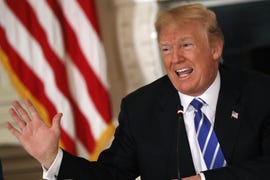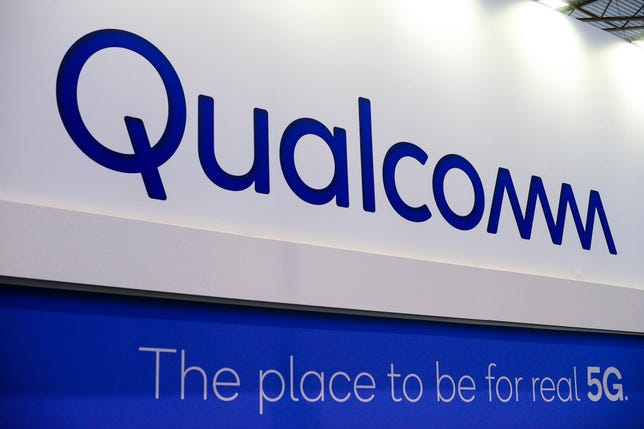Donald Trump just stepped into the global 5G “arms race.”

President Trump has killed the Qualcomm-Broadcom deal.
Chip Somodevilla / Getty Images
The US president late Monday issued an executive order blocking a corporate merger, Broadcom’s proposed $117 billion deal to buy mobile chip giant Qualcomm, citing national security concerns. The order came a week after the Committee on Foreign Investment in the US, or CFIUS, expressed concern that the takeover of Qualcomm by Singapore-based Broadcom could leave the US behind when it comes to mobile technology.
On Wednesday, Broadcom withdrew its offer for Qualcomm, saying it would comply with the order.
What’s unusual is the timing of both the warning and the presidential order, which came before Qualcomm and Broadcom ever formally agreed to a deal. CFIUS, which is part of the Treasury Department, tends to step in only after a deal is struck and has to go through regulatory review. Indeed, Qualcomm was in the midst of fighting off a hostile takeover. The expedited action underscores the government’s view of the importance of 5G wireless technology.
“There is credible evidence that leads me to believe that Broadcom … might take action that threatens to impair the national security of the United States,” Trump wrote in the executive order.
5G, or the fifth generation of cellular technology, is seen as a potential game-changer because of its heightened speed, responsiveness and ability to handle a myriad of connected devices. Beyond giving you a much faster connection on your phone, 5G could serve as the communications foundation for emerging technologies like self-driving cars, streaming virtual reality experiences and advanced telemedicine options like remote surgery.
But multiple companies want to influence how 5G technology works, and they’re jockeying for position. Unlike older wireless tech such as 3G, where a Verizon Wireless smartphone wouldn’t work on AT&T’s network, 5G is formed via a global standard that every country and company agrees to. While many of the standards are in place, there are still plenty of details to be worked out.
5G influence
That’s where Qualcomm comes in. The San Diego, California-based company, the world’s largest maker of chips for smartphones (if you own a high-end Android smartphone, it’s likely using a Qualcomm processor), owns a number of the technologies that served as the foundation for 3G and 4G technology, and it’s been pouring R&D dollars into 5G.


Qualcomm was touting its 5G prowess at the Mobile World Congress in Barcelona, Spain, last month.
Joan Cros / NurPhoto via Getty Images
“Details of the security risk are likely around 5G cellular technology [where] Qualcomm, in our view, is well ahead of foreign and domestic competitors,” said Stifel analyst Kevin E. Cassidy in a report late Monday.
Apparently, the US government agrees.
“Reduction in Qualcomm’s long-term technology competitiveness and influence in standard setting would significantly impact US national security,” CFIUS said in its recommendation. The agency pointed specifically to foreign investment in 5G from Chinese telecom giant Huawei as a potential threat.
The prospect of Broadcom buying Qualcomm and its valuable 5G research reportedly led Intel to consider buying Broadcom. Intel, which sells chips for laptops and desktops, missed the boat on smartphone chips. It sees 5G as a fresh start to make a bigger mark in the mobile world, but likely didn’t want to compete against the combined might of Broadcom and Qualcomm.
Intel declined to comment.
Related stories
- Trump blocks $117 billion Broadcom-Qualcomm merger
- What is 5G? Here are the basics
- Not just speed: 7 incredible things you can do with 5G
- 5G super speeds are coming. Here’s what they’ll be like
Industry observers say the executive order is spurred as much by political motives as technological ones, especially on the heels of Trump’s tariffs on aluminum and steel against foreign countries.
“It’s making sure one of the greatest made-in-America companies stays that way to allow America to shape the future of communication,” said Carolina Milanesi, an analyst at Creative Strategies.
It’s clear that Trump administration and the White House places a great value on 5G. After all, the government even floated the idea of building its own national 5G network as a way to ensure its wireless lead over foreign rivals.
Broadcom said in a statement that it’s reviewing Trump’s order and that it “strongly disagrees” that the proposed acquisition poses any national security risks.
What does this mean for 5G?
Broadcom’s offer for Qualcomm would have made for the biggest deal in tech history. It also would’ve created a chip juggernaut that makes processors for everything from cars to television set-top boxes.
That may not have been a good thing.
“The combined entity would have had dangerously dominant positions in some core markets such as location technologies, Wi-Fi, Bluetooth, RF hardware and automotive semiconductors,” said ABI Research analyst Stuart Carlaw.
There also remained concerns about whether Broadcom, run by Chief Executive Hock Tan, would’ve slowed down Qualcomm’s aggressive investment in 5G.
“Broadcom does not have a history of investing in technological advancements, which is what Qualcomm has always done,” Milanesi said. “The concern was that the path of innovation under Broadcom would come to an end.”


5G is fast and responsive enough that you could control robotic hands remotely to perform surgery.
Celso Bulgatti/CNET
Broadcom, for its part, said last week that it would make the US a global leader in 5G and that it would create a $1.5 billion fund to train and educate engineers here.
“Broadcom will not only maintain the R&D resources Qualcomm devotes to 5G and innovation in future wireless standards – we will also focus R&D spend to those critical technologies that are essential to the US,” Broadcom said in a statement.
Gartner analyst Mark Hung said 5G is too important a technology for either company to forego, and didn’t see Broadcom reducing its investment had the deal gone through.
The US carriers have been particularly aggressive with 5G. Both AT&T and Verizon have vowed to launch some form of the service this year, and Sprint and T-Mobile say they’ll have 5G in markets by 2019. Likewise, carriers in China, Japan and South Korea, which tested 5G in the Olympic Village in Pyeongchang, are looking to take the lead in 5G.
Given that Qualcomm already funds a lot of 5G tests between different carriers and device makers, having it run as an independent company may be in the best interest of the technology.
“This is a positive as it will speed up the development of 5G,” said Patrick Moorhead, an analyst at Moor Insights & Strategy.
Originally published March 13 at 7:57 a.m. PT.Updated March 13 at 12:03 p.m. PT: To include a response from Intel.Updated March 14 at 5:48 a.m. PT: To include Broadcom’s withdrawal of the Qualcomm offer.
Blockchain Decoded: CNET looks at the tech powering bitcoin — and soon, too, a myriad of services that will change your life.
‘Alexa, be more human’: Inside Amazon’s effort to make its voice assistant smarter, chattier and more like you.



